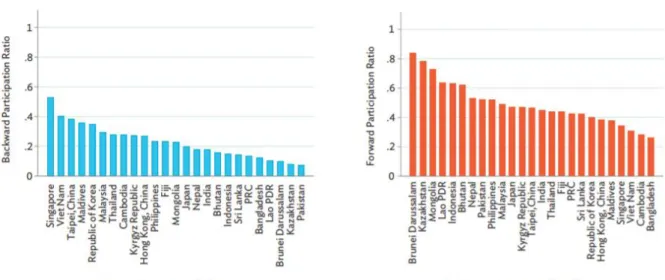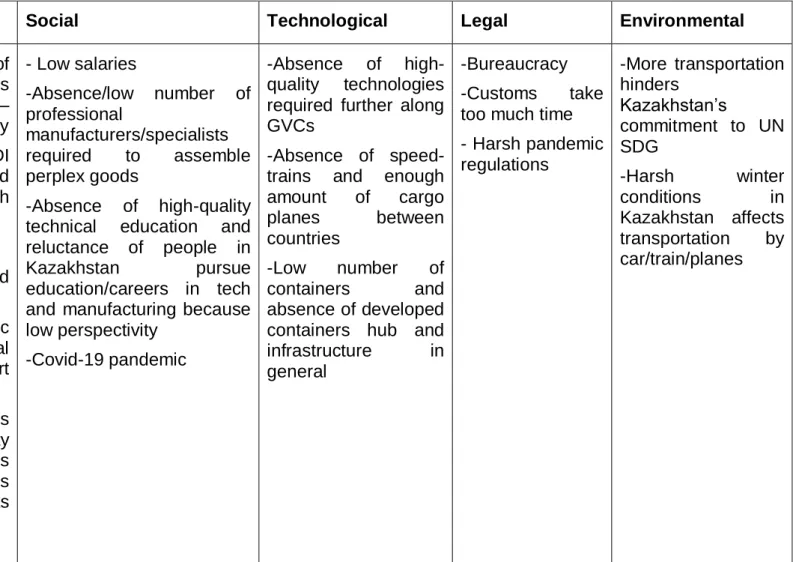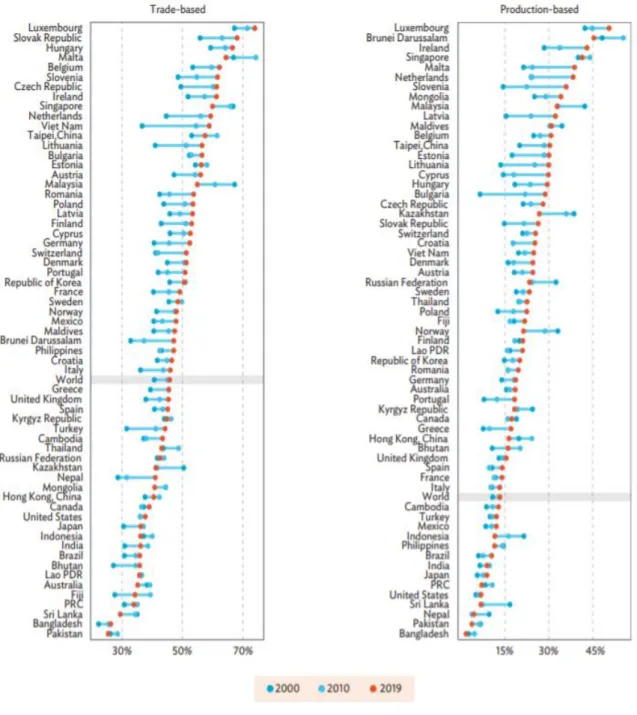The author presents several factors that influence Kazakhstan's position in global value chains, as well as a more detailed assessment of the benefits and challenges of global value chains of Kazakhstan. Global Value Chains (GVCs) – international production division, where the process of creating a product is broken down into activities carried out across borders (Seric & Tong, 2019); The emergence and extensive spread of global value chains were the result of the growth of the global division of labor in the context of the formation of the global economy in the later decades of the twentieth century.
The focus on natural resources has led to lower development of other trade sectors, which has a negative impact on the diversification of the country's economy. In the second chapter, a comprehensive literature assessment of the country's place in global value chains identified benefits, challenges and factors affecting the country's participation in GVCs based on the PESTLE analysis and recommendations for Kazakhstan. The fourth part provides an analysis of the carried out fieldwork in comparison with literature sources.
In conclusion, the author highlighted the key points and offered several recommendations regarding the further development of the national economy of the Republic of Kazakhstan in global value chains.
Current situation-Evaluation of Kazakhstan’s position in GVCs
One of the most prominent areas in which Kazakhstan is gaining a better position in the GVC is the production of cars and electronics. The first category that affects Kazakhstan's position in the GVC is political factors inside and outside the country. The main route connecting Kazakhstan to the rest of the world passes through the Russian Federation.
The concept of the investment policy includes the further development of the investment ecosystem, promoting the growth of private sector investment activity and deep integration into global value chains. For example, if Kazakhstan has a lower environmental standard, other countries may be against the damage the country may cause to the environment. In fact, the country's agricultural industry productivity rate is currently quite low due to high transaction costs and large regional differences in agri-food production (OECD, 2019).
The second chapter was devoted to the literature review of Kazakhstan's participation in the GVC, which was categorized as advantages, challenges, factors influencing Kazakhstan's participation (PESTLE analysis) and recommendations. In addition, the literature review covers a comprehensive assessment of the country's place in global value chains based on international indices. And the PESTLE analysis will be used so that the structured analysis of the factors affecting the participation of Kazakhstan in the Global Value Chains will be presented in the right way.
The first respondent is a manager of the railway logistics company "TG Impex", the reason for conducting the interview is that logistics is an important part of GVCs and the manager can evaluate the situation from a professional perspective, real examples can provide and give recommendations that really work. Similarly, from her professional perspective, the logistics manager also added that the logistics infrastructure is a key factor affecting the participation in global value chains due to the need to transport the goods through the roads of the country. And emphasized that the growth in backward participation of Kazakhstan is better for economy of the country.
More railway branches should also be constructed to reduce the burden on the railway lines. One of these is the country's low backward participation ratio due to the predominance of natural resource exports such as oil and gas. However, this point was contradicted by one of the respondents due to the fact that this was developing.
Participation in the GVC will facilitate the transition of the country's economy from the supply of natural resources and raw materials to the production of goods and services with high added value.

Advantages
Challenges
On the other hand, Akhtanova and Tamenova (2019) suggested that Kazakhstan is currently at a disadvantageous position in GVC. For the study, Akhtanova and Tamenova (2019) used the method of backward and forward participation ratios. Therefore, Akhtanova and Tamenova found out that Kazakhstan participates only in the lowest links of global value chains and still has a long way to go.
In addition, World Bank researchers Arenas and Izvorski (2020) suggested that Kazakhstan's position in GVCs has weakened in the period from 2008 to 2017. They found that compared to the past, Kazakh exports use less foreign resources with a notable decrease in value added by exports, which fell from 20 to 7% during the period. Likewise, Arenas and Izvorski (2020) noted that local production has also become less dependent on external demand, falling from 41 to 25% and more dependent on domestic demand over the decade.
This means that Kazakhstan has lost export competitiveness, which limited export opportunities for local companies. On top of that, since the country entered the Eurasian Economic Union, there was a noticeable increase in tariffs, which also negatively affected Kazakhstan's position in GVCs. Furthermore, UNCTAD (2020) reported that poor logistics and slow customs control worsen Kazakhstan's position in international trade.
The main limitation is the need for cargo transshipment at border control, which occurs due to discrepancy in track gauge standards between Kazakh and Chinese railways (UNCTAD, 2020). The long delays that occur due to congestion of transshipment capacity also demonstrate that Kazakhstan has poor capacity of facilities at border crossing points. For this reason, unless logistics and customs control are improved, Kazakhstan will maintain its weak position in regional Asian value chains.
PESTLE analysis
Absence of high quality technical education and reluctance of people in Kazakhstan to pursue education/career in technology and manufacturing because they have low perspective. These days, it is more relevant than ever to consider policy implications for GVCs in Kazakhstan due to the vital political changes in neighboring countries. Such as the January 2022 riots in major cities of Kazakhstan that led to the suspension of vital activities of local businesses and restriction of internet connectivity.
Candidate of Economic Sciences Nikita Maslennikov commented in his interview to FBA "Economy Today" that banditry and terrorist attacks have called into question the international reputation of the economy, so Kazakhstan needs to focus on restoring investment attractiveness. In fact, since the election, the President of Kazakhstan Kassym-Jomart Tokayev began to reform large state units and improve the rules on the number of spheres. For example, he is holding a meeting of the Supreme Council for Reforms on March 3, 2022, and the establishment of new approaches to investment policy was considered.
Kazakhstan in regional and global value chains leading to weakening international image and ties, the government keeps the situation under control by creating new programs and initiatives. In general, the social factors affecting Kazakhstan's GVC are all related to the lack of professional labor. In addition, the main reasons were discussed, such as low wages in technology and manufacturing, lack of high-quality technical education, and reluctance of people in Kazakhstan to pursue education/careers in technology and manufacturing due to low prospects (Accord, 2022).
Vinokurov and Tsukarev (2018) noted that the extent of containerization in Kazakhstan is still quite low compared to e.g. neighboring Russia. Second, harsh winter conditions in Kazakhstan affect road/train/air transport by restricting movement of cargo and delays in adverse weather conditions. To summarize, PESTLE analysis provides the factors affecting Kazakhstan's participation in GVCs from different perspectives.

Recommendations
However, some local residents seem to be skeptical about the benefits of cooperatives due to the bad experiences during the Soviet era, although international practice proves the effectiveness of grassroots cooperatives in the long term (OECD, 2019). The methodology will be conducted through face-to-face and online interviews of people as it allows for the collection of open information and the exploration of the thoughts, feelings and beliefs of the research participants (Dejonckheere & Vaughn, 2019). One of these is signing the informed consent of the interviewees, so that participants can have confidence in anonymity.
This part of the research paper aims to analyze the information obtained from interviews with the information received from issue-related secondary sources. As mentioned earlier in the literature review, one of the most important industries that Kazakhstan has acquired in global value chains is the automotive and electronics industry. Thus, by providing a brief explanation of the main factors influencing the country's participation in global value chains, interviewees provided examples of influencing factors, which find support in previous literature research.
The answer from the master's program supported this argument and also stated that he investigated participation conditions on. From a logistics perspective, one of the important challenges is thus weak IT support for processes. In 2018, Bussel stated to expand domestic production and expand the diversity of durable raw materials and more complex consumer goods, which will bring long-term industrial diversification of the economy.
The government should therefore further develop the country's good image, such as excellent preparation for the EXPO-2022 in Dubai, provided that the attractiveness of the state for foreign direct investments increases. Many authors also made recommendations for development in the field of logistics and infrastructure (Paul and Khan, 2015). As a result of the work done, the objectives identified at the beginning of the research have been fully completed: the role of the GVC in the development of the economy of Kazakhstan was discovered, and factors affecting the participation of it land of GVCs and practical ways to increase them were also analyzed and presented.
Akorda.kz Hentet 4. april 2022 fra: https://akorda.kz/en/kassym-jomart-tokayev-holds-a- meeting-of-the-supreme-council-for-reforms-323036. Hentet 24. april 2021 fra http://documents.worldbank.org/curated/en Kazakhstan-Trade- Competitiveness-and-Diversification-in-the-Global-Value-Chains-Era.


